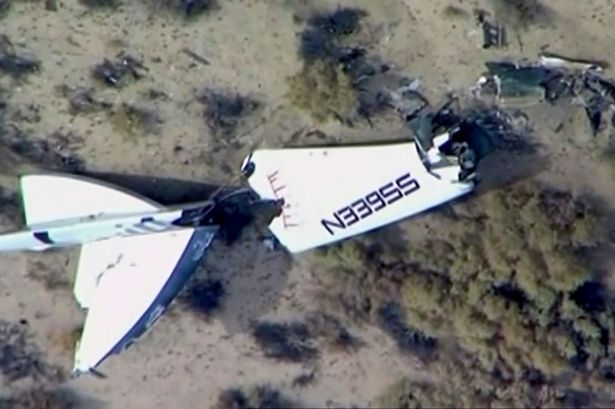
According to NTSB investigators, a safety device on the Virgin Galactic spacecraft that crashed on October 31 killing test pilot Michael Alsbury, had been deployed early.
NTSB Chairman Christopher Hart said the “feathering” device, designed to slow the craft on re-entry, activated without a command from the pilots.
However, Christopher Hart said it was too soon to confirm any possible cause of the crash.
Media reports had focused on the fuel tanks and the engine, but Christopher Hart said both were found intact.
Virgin Group founder Sir Richard Branson accused a “handful of British newspapers” of publishing “wild accusations” over the crash.
Richard Branson said initial findings from US investigators had shown reports that suggested problems with the fuel or engine had caused an explosion were “garbage”.
Virgin Galactic had aimed to send tourists into space early next year, and has already taken more than 700 flight bookings at $250,000 each.
Christopher Hart told reporters that the feathering device was supposed to be activated at Mach 1.4 (1,065mph; 1,715km/h), but had been deployed at Mach 1 during the test flight.

He said one of the pilots had enabled the device, but the second stage of its deployment had happened “without being commanded”.
“Shortly after the feathering occurred, the telemetry data terminated and the video data terminated,” Christopher Hart said.
The feathering device lifts and rotates the tail to create drag, slowing the craft on its descent.
He said SpaceShipTwo’s fuel tanks and engine were found intact, without any sign of being breached.
NTSB investigators have now found almost all of the parts of the crashed spacecraft as part of an inquiry they say could take many months to complete.
SpaceShipTwo was flying its first test flight for nine months when it crashed near the town of Bakersfield.
Virgin Galactic said the craft experienced “a serious anomaly” after it separated from launch vehicle WhiteKnightTwo.
The spacecraft was using a new type of rocket fuel never before used in flight, although officials said it had undergone extensive ground testing.
The project has been subject to numerous delays, and its commercial launch has been pushed back several times.
The Financial Times reported that the venture is facing financial difficulties – with $400 million in funding from Abu Dhabi now dried up and Virgin Group covering the day-to-day expenses.
Co-pilot Michael Alsbury, 39, died when SpaceShipTwo disintegrated shortly after take-off.
Scaled Composites, the company employing both pilots, said surviving pilot Peter Siebold, 43, was “alert and talking with his family and doctors”.
[youtube iOkRF6OXN7g 650]